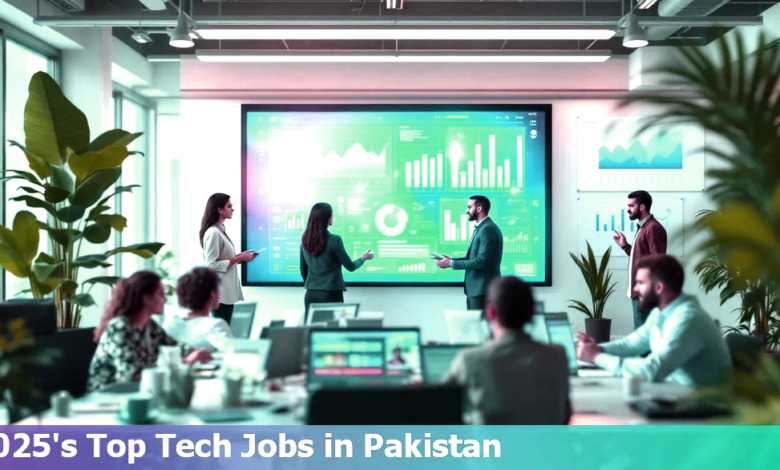Top Business Tech Trends Reshaping Pakistan in 2025
Explore the top business tech trends reshaping Pakistan in 2025, from AI and fintech to e-commerce and renewable energy solutions.

The business tech trends transforming Pakistan in 2025 are setting the stage for a digital revolution, redefining how enterprises operate and compete. As the country embraces rapid technological advancements, businesses across sectors from finance to agriculture are leveraging cutting-edge innovations to boost efficiency, enhance customer experiences, and drive sustainable growth. With increasing internet penetration, a youthful population, and government-backed digital initiatives, Reshaping Pakistan is witnessing unprecedented adoption of AI, blockchain, fintech, and smart logistics. These business tech trends are not just Reshaping Pakistan industries but also positioning Pakistan as an emerging tech hub in the region.
The shift toward a digital-first economy is accelerating, with startups and established corporations alike integrating automation, data analytics, and cloud computing into their operations. E-commerce is booming, fintech is disrupting traditional banking, and renewable energy solutions are gaining traction as businesses prioritize sustainability. However, challenges such as cybersecurity risks, infrastructure gaps, and skill shortages remain hurdles to full-scale digital transformation. Understanding these business tech trends is crucial for entrepreneurs, investors, and policymakers aiming to capitalize on Pakistan’s evolving economic landscape in 2025 and beyond.
Top Business Tech Trends Reshaping Pakistan in 2025
Artificial Intelligence and Automation
Artificial intelligence (AI) is no longer a futuristic concept it is now a critical tool for businesses in Pakistan. Companies are integrating AI-powered chatbots, predictive analytics, and machine learning to streamline customer service, optimize supply chains, and improve decision-making. For instance, banks are using AI for fraud detection, while e-commerce platforms leverage recommendation engines to personalize shopping experiences. Automation is also reducing manual workloads in manufacturing, allowing businesses to cut costs and improve productivity. As AI adoption grows, Reshaping Pakistan, Pakistani firms must invest in training employees to work alongside these advanced systems.
Blockchain for Transparency and Security
Blockchain technology is gaining traction in Reshaping Pakistan, particularly in finance, healthcare, and supply chain management. Its decentralized nature ensures secure, tamper-proof transactions, making it ideal for reducing fraud and enhancing transparency. The State Bank of Pakistan has been exploring blockchain for digital currency initiatives, while startups are using smart contracts to automate agreements. Additionally, industries like agriculture are adopting blockchain to track product origins, ensuring authenticity for exports.
E-Commerce and Digital Payments Boom
Pakistan’s e-commerce market is expanding rapidly, with more consumers shifting to online shopping. Platforms like Daraz, Alibaba, and local startups are witnessing record growth, supported by improved digital payment systems. The rise of mobile wallets, QR code payments, and buy-now-pay-later (BNPL) services is making transactions more accessible, even in rural areas. Social commerce is also on the rise, with businesses leveraging Instagram and TikTok for sales.
Renewable Energy and Sustainable Tech
With energy costs rising and climate concerns mounting, Reshaping Pakistan are turning to renewable energy solutions. Solar power, wind energy, and energy-efficient technologies are being adopted by industries to reduce operational costs and carbon footprints. Startups are introducing smart grids and battery storage systems to optimize energy use, while textile manufacturers are implementing sustainable practices to meet global export standards.
Remote Work and Hybrid Workforce Models
The post-pandemic era has cemented remote work as a permanent fixture in Reshaping Pakistan corporate culture. Businesses are investing in cloud computing, collaboration tools like Zoom and Slack, and cybersecurity to support distributed teams. Coworking spaces are gaining popularity in major cities, offering flexible work environments. This trend is also enabling companies to tap into a global talent pool, reducing overhead costs while maintaining productivity. However, challenges such as digital literacy and infrastructure gaps must be addressed to fully realize the potential of hybrid work models.
Fintech Revolution and Digital Banking
Pakistan’s fintech sector is booming, with digital banks, peer-to-peer lending platforms, and insurtech startups disrupting traditional financial services. The State Bank’s licensing of digital banks marks a significant milestone, promoting financial inclusion for the unbanked population. Mobile banking apps, micro-loan platforms, and cryptocurrency exchanges are gaining user trust, though regulatory clarity remains essential. Businesses that integrate fintech solutions can expect faster transactions, improved cash flow management, and access to alternative funding sources.
Smart Logistics and Supply Chain Tech
Efficient logistics are critical for Reshaping Pakistan growing trade and E-commerce sectors. Companies are adopting IoT-enabled tracking, drone deliveries, and AI-powered route optimization to enhance supply chain efficiency. Startups like Truckistan and Bykea are digitizing freight and last-mile deliveries, reducing delays and costs. As cross-border trade increases, businesses must leverage smart logistics to stay competitive in regional and global markets of Reshaping Pakistan.
HealthTech and Telemedicine Expansion
The healthcare industry in Reshaping Pakistan is undergoing a digital revolution, with telemedicine platforms, AI diagnostics, and wearable health tech gaining prominence. Startups like Sehat Kahani and Marham are connecting patients with doctors remotely, improving access to healthcare in underserved areas. Hospitals are adopting electronic health records (EHRs) and AI-driven diagnostics for better patient care. This trend is expected to grow, especially Reshaping Pakistan with increasing health awareness and government support for digital health initiatives.
EdTech and Online Learning Platforms
Education technology is transforming Pakistan’s learning landscape, Reshaping Pakistan with platforms like Taleemabad and Sabaq offering affordable, accessible education. AI-driven personalized learning, virtual classrooms, and skill-based courses are empowering students and professionals alike. Corporations are also using EdTech for employee training, ensuring workforce readiness for a digital economy. As internet penetration improves, online education will play a crucial role in bridging Reshaping Pakistan skills gap.
Cybersecurity and Data Privacy
With digital transformation comes heightened cybersecurity risks. Pakistani businesses are prioritizing data protection, investing in encryption, multi-factor authentication, and threat detection systems. The government is also drafting stricter data privacy laws to align with global standards. Companies must adopt robust cybersecurity measures to safeguard customer information and maintain trust in an increasingly digital marketplace.
Read More: A Complete Guide on How to Repost on TikTok
Conclusion
The year 2025 is poised to be a landmark period for Pakistan’s business sector, with business tech trends driving unprecedented change across industries. From AI and blockchain to fintech and renewable energy, these innovations are setting the stage for a more efficient, inclusive, and sustainable economy. Businesses that embrace these advancements early will gain a competitive edge, while those slow to adapt risk falling behind.
To navigate this dynamic landscape, companies must prioritize digital transformation, invest in employee upskilling, and foster a culture of innovation. Government policies supporting tech adoption and infrastructure development will further accelerate growth. As Pakistan positions itself as a rising tech hub in the region, the businesses that harness these business tech trends will lead the charge toward a prosperous and digitally empowered future.
FAQs
How is AI impacting businesses in Pakistan?
AI is enhancing efficiency in customer service, fraud detection, and supply chain management, helping businesses reduce costs and improve decision-making.
Why is blockchain important for Pakistan’s economy?
Blockchain ensures secure, transparent transactions, reducing fraud in finance, supply chains, and government records while boosting investor confidence.
What is driving Pakistan’s e-commerce growth?
Increased internet penetration, digital payment solutions, and social commerce are key factors fueling the expansion of online shopping in Pakistan.
How are renewable energy technologies benefiting businesses?
Solar and wind energy solutions help companies cut electricity costs, meet sustainability goals, and comply with international export standards.
What challenges does Pakistan face in adopting these tech trends?
Limited digital infrastructure, regulatory hurdles, and skill gaps pose challenges, but government initiatives and private-sector investments are addressing these barriers.











